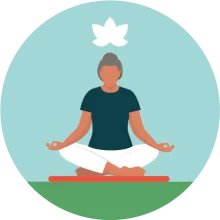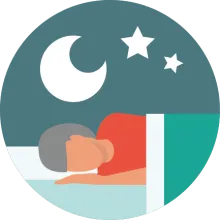
September is Healthy Aging Month and is an opportunity for everyone to be mindful of the health of getting older. That said, myths and misunderstandings of ageism and an anti-aging culture overshadow “healthy aging” as more of an oxymoron than an opportunity. Yet, research and advances in aging studies and medical care reveal an incredible increase in adults over 65 who live much longer. No matter our lifestyle or decisions, we now have more information and opportunities about how to age and enjoy a greater quality of life. Remember to care for ourselves during National Healthy Aging Month while adding caregiving to our long-term health equation. As family caregivers, we are often more mindful of aging considerations for the person (or people) we care for. In the United States, more than 1 in 6 people provide care to a person 50 and over, and most of these caregivers are over the age of 50 themselves.
The great thing about medical advances, aging, and longevity research is that no matter how we live, we have more opportunities to make choices that will benefit our well-being. Here are some approaches to healthy aging with a sprinkling of caregiving considerations:
Take a proactive approach to your physical and mental health.

- Carving self-care time to see your doctor or get that check-up is crucial to healthy aging and caregiving. Caregiving can affect our physical health and how we age; it can contribute to depression and anxiety, a weakened immune system, weight issues, chronic diseases like heart disease, cancer, diabetes, and even cognitive issues.
- Whether you are a caregiver or not, use your health benefits to stay current with health checkups, dental and eye appointments, and the specialist you need to stay as healthy as possible.
- Energy, time, and emotion dedicated to others can bring something like you own check-up to the bottom of the self-care list. Are you pressed for time? Schedule your flu shots, mini health, prostate (POP), or 3D Mammogram screening through Life and Work Connections.
Move!

- The myth remains that physical decline in our later years is inevitable, and exercise is pointless as we age. The reality is that exercise is the closest thing we found to a magic pill for combating the effects of aging. Exercise boosts immunity, prevents bone loss, relieves pain, combats chronic illness, and improves mood and brain function. Even moderate activity can increase cognitive function, prevent disease, and improve healing from injuries or wounds. Exercise can also help with balance, which is essential for fall prevention and mitigating the fear of falling. Other benefits of movement include less pain and disability and increased longevity while offering better options for healthy weight, bone density, and muscle mass.
- Participating in pickleball, yoga, balance walking, gardening, dog walking, and even household chores can improve the health and social well-being of aging and caregiving people.
- If you can’t get time alone, consider involving the person or people you care for in your activities. Better yet, explore opportunities for the older adult and the caregiver to experience the benefit of moving together.
Be mindful about your nutrition.

- Good nutritional choices can improve our health as we age and improve brain function. Healthy nutritional choices offer the opportunity to reduce the risk of chronic diseases, like heart disease and cancer, and better address challenges like muscle and bone mass. We often hear varying information about nutrition and aging. The Department of Health and Human Services states that although older adults have lower calorie needs, nutrient needs become greater. Other guidelines include increasing the consumption of fruits, vegetables, whole grains, and dairy while decreasing added sugars, saturated fat, and sodium. Good influences of healthy aging include getting enough protein and vitamin B-12. One more very important (and often rarely considered) aspect of nutrition and healthy aging is drinking enough fluids.
- Are you seeking time and opportunity to learn more about aging and nutrition? Check out Life and Work Connections workshops on preventative health topics or attend upcoming nutritional events.
Be Mindful About Choices with Alcohol, Drugs (Including Prescriptions).

- Healthy aging requires additional consideration with medication, different reactions or feeling effects, and greater potential for accidents and falls. Problems with alcohol can arise at any age. However, alcohol misuse in older adults may be overlooked and more difficult to detect because signs may be similar to other health issues. Although Alcohol Use Disorder (AUD) affects 1-3% of older adults in treatment settings (doctor’s offices, hospitals, mental health settings), this occurrence may increase by 0-15%. Healthy aging may require increased conversations and attention to care and treatment.
- The never-ending cycle of focus on the people we care for may cause our vulnerability to addiction to go unnoticed. Caregiver stress and burnout can be related to loss of social connections and loneliness, mental health challenges like depression, anxiety, and emotional strain. Resources for help and better choices are available through caregiver and mental health advocacy groups like the Substance Abuse and Mental Health Services Administration (SAMHSA). We now have better options for support to address habits like smoking or excessive drug or alcohol consumption.
- Reduced alcohol consumption can improve sleep, hydration, liver and immune function, and mood. It can also decrease weight, inflammation, and blood pressure.
- Part of the equation with healthy aging includes the use of prescription medication. Aging may require medications for chronic health issues. Medication use (prescription and nonprescription supplements) can lead to a higher rate of exposure to potentially addictive effects. But this is an intergenerational issue; one study indicates that for adults between the ages of 18-50, nearly half of the 26 575 in this study reported prescription drug misuse.
Never, ever underestimate the power of rest.

- 76% of caregivers are losing sleep. Sleep issues can be internal due to stress, depression, and anxiety. On an external level, the caregiver may be up to assist with care or monitor a loved one(s). With caregiving and caregiving relating to Alzheimer’s disease and other related dementias, it is essential to address the challenges to ensure that the caregiver gets the rest needed.
- The benefits of good sleep include improved memory, learning, cognition, and mental health.
- Do you have issues with insomnia, sleep apnea, or other sleep-related movement disorders? You are not alone. Insomnia is the most common sleep problem among people over 60. Along with recommendations for getting a good night’s sleep, talk with your doctor to create a plan to improve sleep patterns.
As we consider the changes that can occur with aging, we have access to research, information, and resources that allow us to make choices for a better quality of life in our later years. Healthy aging is about seizing the opportunities and possibilities and living the best life possible.

